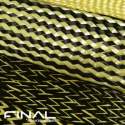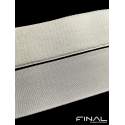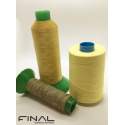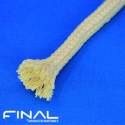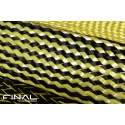Aramid Fibre
Final Advanced Materials has a wide range of aramid products available: threads, tapes, fabrics, packings, sleeves, braided ropes, self-gripping tapes, etc.
What Are Aramid Fibres?
The word 'aramid' is a contraction of 'aromatic polyamide'. The chemical name is para phenylene terephthalamide or PPD-T. Created in the 1960’s, aramid fibres consist of yellow filaments of about ten microns in diameter, assembled into threads. There are three main families of polyamides:
- Para-aramids: used in many fields with high-tech applications, they are mainly known under the brand name Kevlar®, from DuPont, and are used for their mechanical properties.
- Para-aramid copolymers: derived from para-aramids, these are also used for their excellent mechanical properties.
- Meta-aramids: these are mainly recognised for their thermal and chemical characteristics and are known under the brand name Nomex® from DuPont. They are mainly used in the fields of technical textiles and protective clothing.
Manufacturing of Aramid Fibres
Paraphenylenediamine is reacted with terephthalyl chloride in an organic solvent to obtain PPD-T. The polymer obtained is dissolved in sulphuric acid. The polymer is then partially oriented into a liquid crystal form. This polymer is extruded in a die and spun. The filaments are cooled by an air jet. The washing, drying and spooling phases are then carried out. The difference between para-aramid and meta-aramid arises from the place the functional groups have on the aromatic rings.
Source : INRS, 2018
General Characteristics of Aramid Fibres
Traction modulus and resistance
The aramid fibres have a tensile strength equivalent to that of steel and a traction modulus that can be up to two times higher than that of glass. These properties make it a balanced material with excellent tensile strength.
Compressive strength
Aramid fibres have poor compression characteristics, which is a probable consequence of their poor adhesion to resins.
Flexural strength
Aramid fibres have poor compression characteristics, which is a probable consequence of their poor adhesion to resins.
Elongation at break
The fibre is elastic under a low load and plastic under a heavy load, demons-trating a degree of similarity with metals.
Resistance to UV
Aramid fibres are highly sensitive to UV rays (loss of characteristics and discolouration). It is advisable to store aramid fibre materials away from light.
Thermal characteristics
Aramid fibres have good thermal resistance. The elastic modulus under tension keeps at 300 °C more than 80 % of its value at room temperature. Aramid fibres are used continuously at an average temperature of 200 °C. They have a coefficient of thermal conductivity of around 0.05 W.m-1.K-1.
Benefits of Aramid Fibres
- High tensile resistance
- High elastic modulus
- Excellent vibration damping factor
- Low density
- Excellent thermal stability from –70 °C to 200 °C
- Does not sustain combustion, does not melt
- Carbonisation at 425 °C
- Good resistance to fatigue
- Excellent dielectric properties
- Good chemical resistance to fuel and seawater but not strong acids and bases
Comparative Table
|
Property |
Unit |
E-Glass |
Steel | Aramid | HT Nylon |
|
Tensile Resistance |
MPa |
3,400 |
2,600 |
2, 400 to 3,000 |
990 |
|
Traction Modulus* |
GPa |
70 |
200 |
45 to 160 |
5.6 |
|
Allongement à la rupture |
% |
4.5 |
2 |
1.9 to 4.5 |
18 |
|
Density |
g/cm3 |
2.6 |
7.8 |
1.44 to 1.47 |
1.14 |
|
Peak Temperature |
°C |
~700 |
~800 |
~300 |
~170 |
*Young’s tensile modulus: the proportionality factor between pressure and deformation, characterising the elasticity of a given material. //Source: INRS
Applications of Aramid Fibres
- Reinforcement of rubber materials (pneumatic, transport belts, piping, transmission belts)
- Reinforcement of composite materials (sports, aeronautical, naval, protective shielding)
- Reinforcement of cables (rope, telecommunication cables, etc.)
- Protective fire and ballistic clothing
- Friction and sealing (brakes, clutches, seals)
Product Range in Aramid Fibres
Our aramid products are primarily made from continuous fibres to achieve the best possible mechanical properties. We offer different aramid textile formats to suit all requirements:
Threads
Aramid fibre sewing threads are known for their excellent thermal and mechanical properties. Moreover, these products are self-extinguishing, non-fusible as well as resistant to abrasion and have high breaking strength. They are therfore ideal for protective applications.
Final Advanced Materials proposes two different types of threads in aramid fibre.
Meta-aramids Nomex® threads are mainly used in the fields of technical textiles and protective clothing. They are valued for their thermal and chemical characteristics. They can withstand operating temperatures up to 200 °C and peak temperatures up to 300 °C.
Para-aramid Kevlar® threads are used in many fields with high-tech applications as they are mainly known for their superior mechanical properties. They can withstand operating temperatures up to 170 °C and peak temperatures up to 350 °C.
Tapes
Aramid fibre tapes consist of para-aramid fibres, that can withstand an operating temperature of 350 °C and peak temperature up to 400 °C. With excellent properties such as their resistance to tearing, to abrasion and mechanical resistance, aramid tapes feature good stability for a wide variety of chemical products. These tapes are mainly used in the industry in the manufacture of fire resistant materials and in transportation. Final Advanced Materials provides aramid fibre tapes in widths ranging from 10 to 100 mm and in thickness from 2 to 5 mm.
Gripping tapes
Aramid fibre gripping tapes are made of aramid loops and self-extinguishing polyamide hooks. They are non-melting and resist to operating temperature up to 140 °C. These tapes can withstand cold as well as most chemicals (excluding acids) and are certified to aeronautical, motor and rail standards. Stainless-steel hooks are also available, increasing the operating temperature resistance to 235 °C. The gripping tapes are available in widths of 25 and 50 mm.
Braided Ropes
Aramid fibre braided ropes are composed of 100 % para-aramid fibres. They are used in different high-tech application fields that value their mechanical properties and their thermal insulation effectiveness. Moreover, these braided ropes can withstand operating temperatures up to 350 °C and peak temperatures up to 400 °C. These products also have good resistance to chemicals and abrasion. The braided ropes are provided in round or square sections ranging from 5 to 15 mm and are available with continuous or discontinuous fibres.
Sleeves
Aramid fibre sleeves are made from continuous filaments that give them excellent mechanical properties. They maintain their characteristics even against operating temperatures up to 350 °C and peak temperatures up to 400 °C. Mainly used in the industry for thermal sealing, they are also employed for the insulation of cables. Moreover, these products offer good resistance to chemicals and to abrasion. The sleeves are provided in inner diameters ranging from 10 to 50 mm.
Fabrics
Woven in plain weave, 100 % para-aramid fabrics have excellent thermal characteristics. In addition to their good insulating properties, they can reach a peak temperature of 500 °C and a continuous temperature of 350 °C. In addition to this, they have excellent resistance to cuts, abrasion, tearing and acids, as well as excellent mechanical properties. Available in different versions (aluminised, fleece, etc.), they are particularly suitable for the manufacture of protective clothing and thermal insulation.
100% para-aramid (Kevlar®) fabrics always include a cross-twill woven version (two single twills in different directions). Particularly resistant to high temperatures up to 450 °C and cuts, it is mainly used to reinforce protective clothing. Coated versions (silicone, aluminium, flame retardant, etc.) are available.
Packings
Packings are made of a glass-fibre core and of a para-aramid fibre sleeve. The glass-fibre core of the packing improves its thermal and mechanical properties Primarily used as insulation products, they are ideal for industrial furnaces.
Physical variables included in this documentation are provided by way of indication only and do not, under any circumstances, constitute a contractual undertaking. Please contact our technical service if you require any additional information.
Aramid Fibre Braided Ropes 400 °C
Aramid Fibre Fabrics 400 °C
Aramid Fibre Gripping Tapes 300 °C



